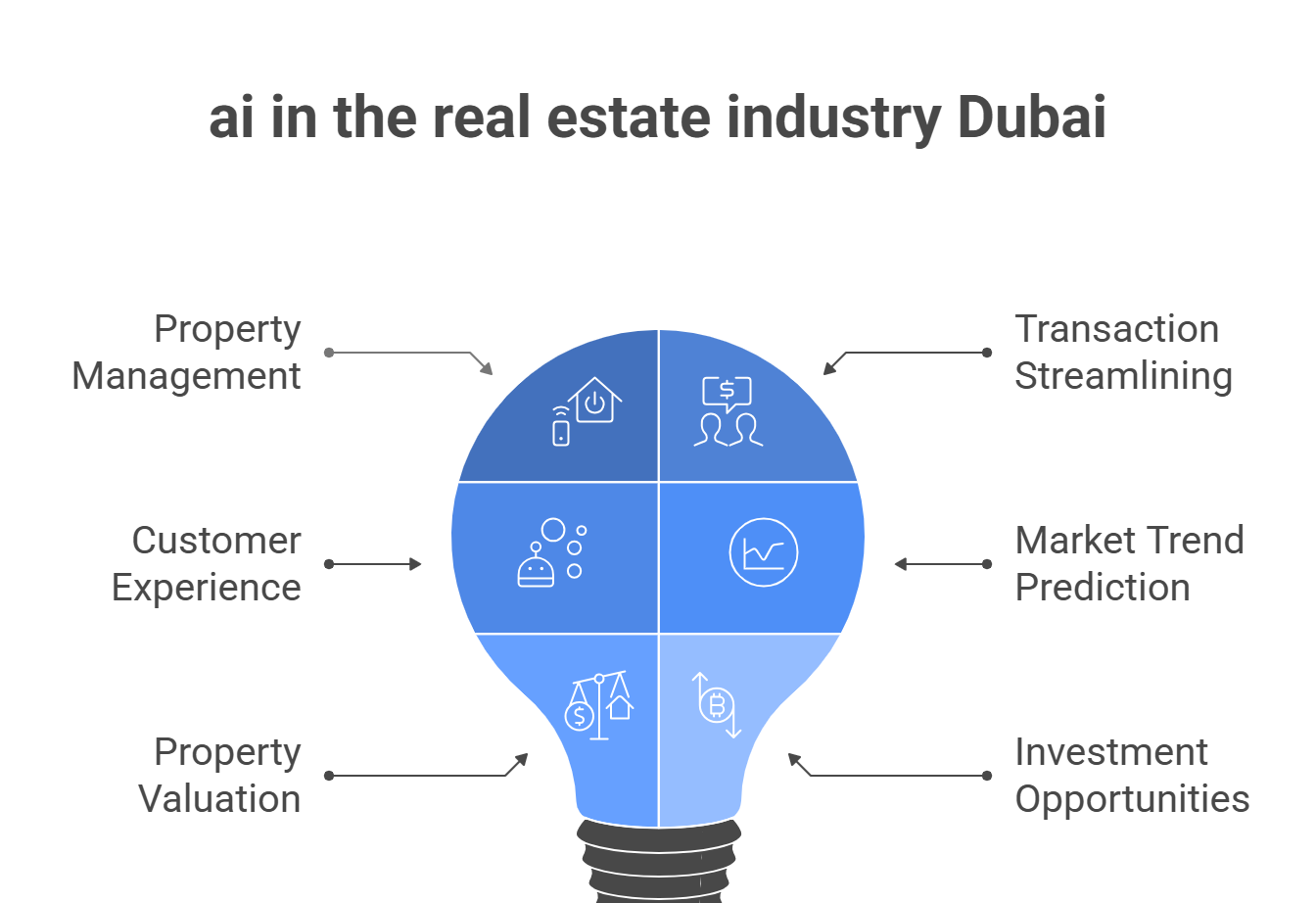Dubai’s skyline is famous for its gravity-defying skyscrapers, but the most significant construction happening now isn’t just physical—it’s digital. The emirate’s real estate market is undergoing a seismic shift, powered by Artificial Intelligence (AI).
This isn’t a far-off futuristic trend; it’s a present-day reality that is reshaping how properties are valued, bought, sold, and managed. From AI-powered valuation tools becoming the market standard to government agencies using algorithms to ensure transparency, Dubai is rapidly building a blueprint for the future of global real estate.
This transformation is no accident. It’s the result of a deliberate, top-down government vision, a thriving tech startup scene, and a market perfectly primed for digital disruption. Let’s explore how this AI revolution is unfolding, who the key players are, and what the future holds for one of the world’s most dynamic property markets.
The Strategic Blueprint: Dubai’s Vision for an AI-Powered Future
The rapid integration of AI into Dubai’s property sector is the direct result of a meticulously crafted national strategy. The emirate’s leadership has identified AI as a crucial engine for economic growth, creating an environment where adopting technology is no longer an option but a necessity for staying competitive.
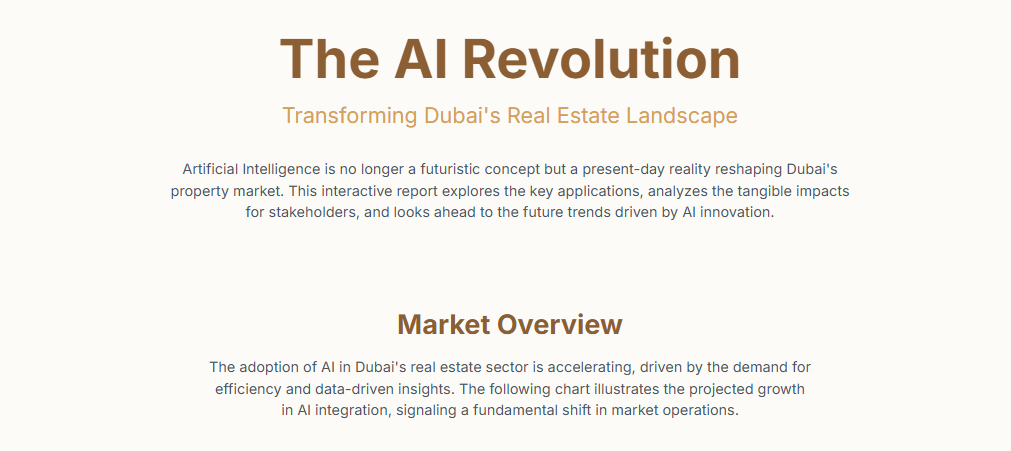
The National AI Strategy 2031 as a Catalyst
The primary engine behind this change is the UAE’s National Strategy for Artificial Intelligence 2031. This ambitious roadmap aims to position the nation as a global AI leader by investing heavily in key sectors, with real estate being a top priority.
This high-level commitment sends a powerful signal to investors and businesses, de-risking private investment and encouraging companies to align their strategies with the nation’s tech ambitions. It creates a powerful tailwind, attracting the capital and talent needed to build a world-class PropTech (Property Technology) hub.
The Dubai Land Department (DLD) as a Tech Enabler
The Dubai Land Department (DLD) has evolved from a traditional regulator into an active architect of the market’s technological future. A cornerstone of its strategy is the Dubai PropTech Hub, which aims to support over 200 startups with more than AED 1 billion in investments.
By directly backing emerging companies, the DLD provides them with crucial resources and a clear path to scale. This ensures a continuous pipeline of innovation that tackles real-world market challenges and pushes the boundaries of technology.
A Market Primed for Disruption
This government vision is perfectly complemented by market conditions that make Dubai uniquely receptive to AI-driven change. The full digitization of property transactions and, most critically, open access to real-time property data have created the perfect storm for disruption. High-quality, accessible data is the essential fuel for any AI or machine learning model.
By making comprehensive datasets available, the DLD has given companies the raw material to develop sophisticated predictive analytics, automated valuation models (AVMs), and personalized recommendation engines, giving Dubai a significant competitive advantage over other global real estate hubs.
AI in Action: Transforming the Entire Property Lifecycle
AI is being systematically woven into every stage of the property journey in Dubai, driving unprecedented gains in efficiency, transparency, and customer experience. These tools are no longer niche—they are becoming indispensable for every stakeholder in the market.
Smart Valuation & Predictive Analytics
Perhaps the most profound impact of AI is in property valuation. Subjective, time-consuming manual appraisals are being replaced by instantaneous, data-driven valuations. AI algorithms analyze vast datasets—including historical sales, demographic shifts, and infrastructure projects—to deliver highly accurate property values and forecast market trends.
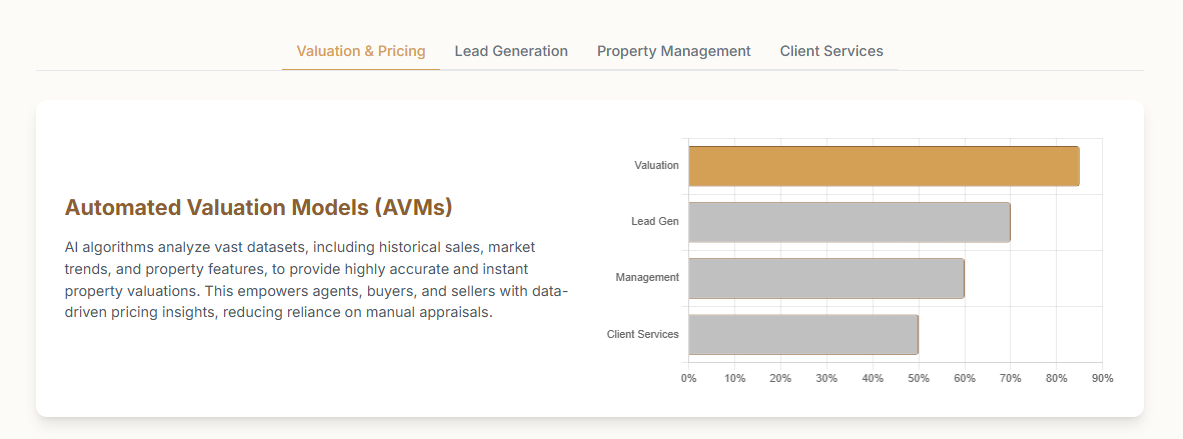
A prime example is Bayut’s TruEstimate™, an AI-powered tool that now supports one in every two property transactions in the UAE. Its adoption in the secondary market surged from just 6% in mid-2024 to an incredible 55% by mid-2025. This creates a “transparency dividend,” where a shared, data-driven value baseline reduces confusion and builds trust, especially among international investors. The government is also a key player, with the DLD’s own Smart Valuation service providing official valuations in as little as 15 seconds via its Dubai REST app.
Personalized Search and Client Engagement
The property search is becoming smarter and more intuitive. Conversational AI platforms like BayutGPT allow users to make complex queries in natural language, such as, “Find me a three-bedroom apartment with a sea view and a gym near a metro station.
” These systems understand nuance and context, delivering highly personalized results. Startups like Prop-AI use sophisticated recommendation engines to analyze user preferences and market data, cutting down the time spent sifting through irrelevant listings from hours to mere minutes.
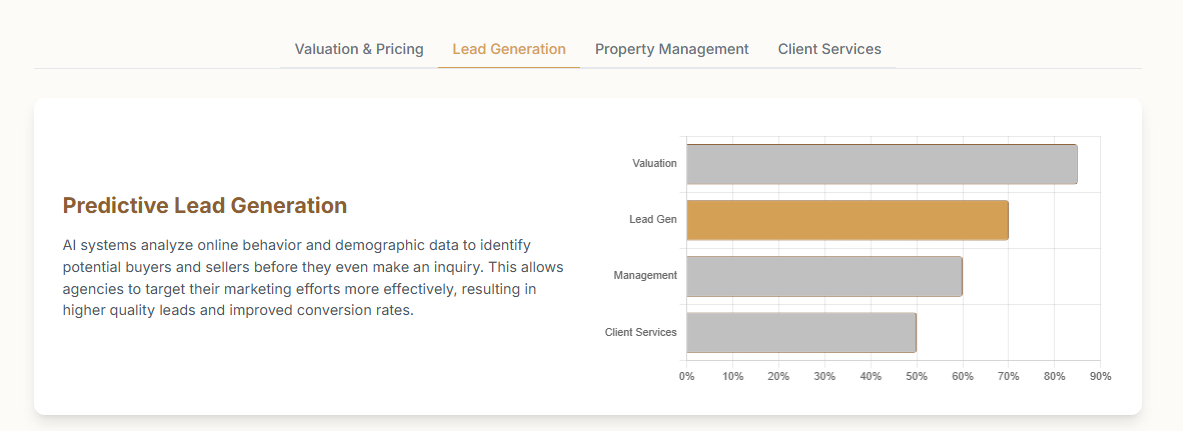
Empowering Agents, Not Replacing Them
The dominant narrative in Dubai is one of augmentation, not replacement. AI is designed to be a “co-pilot” for real estate agents, automating routine tasks so they can focus on what humans do best: strategic advice, complex negotiations, and building client relationships.
AIR (AI Realtor), backed by a $20 million investment, is a platform built on large language models (LLMs) to serve this exact purpose. It handles lead qualification, creates property recommendations, manages schedules, and automates follow-ups. Similarly, Reelly.ai is a B2B platform that helps developers and agents communicate more efficiently, using AI to generate professional buyer presentations in a single click—a task that previously took hours.
Smart Property and Asset Management
The convergence of AI and the Internet of Things (IoT) is making buildings themselves intelligent. In smart buildings across Dubai, AI systems analyze data from sensors for predictive maintenance, anticipating failures in HVAC systems or elevators before they happen. This can reduce operational costs by up to 30% and cut emergency repairs by nearly 40%. It also optimizes energy and water consumption, enhancing both sustainability and tenant satisfaction.
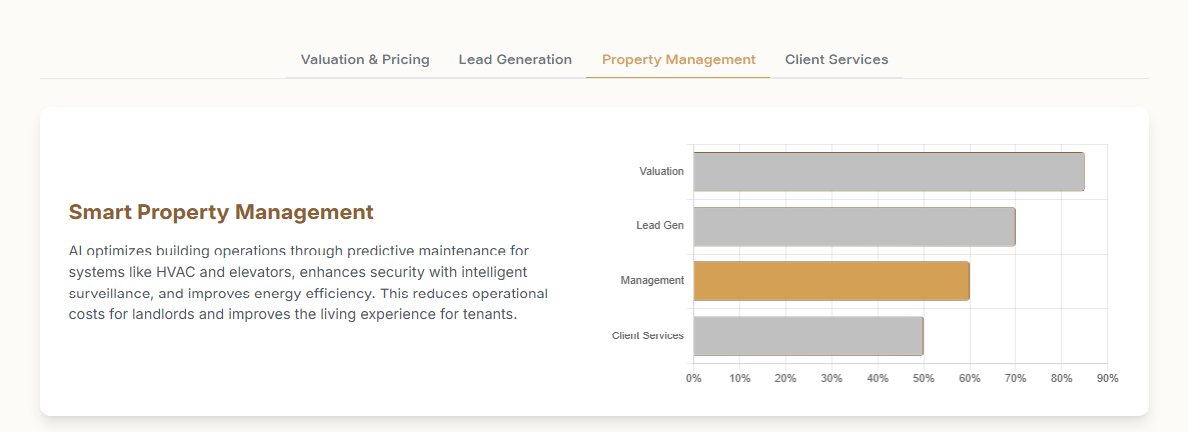
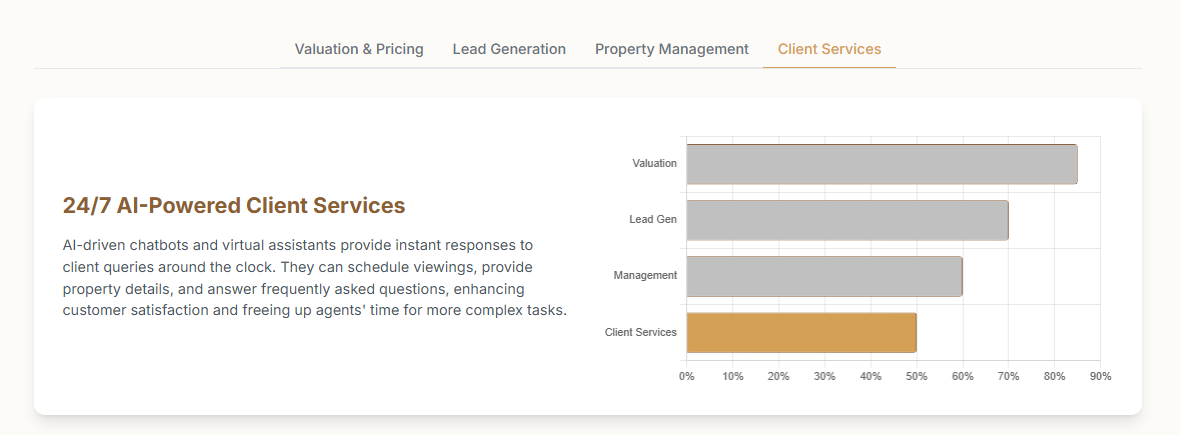
The PropTech Ecosystem and the Road Ahead
Dubai’s PropTech ecosystem is a dynamic arena of established giants, agile startups, and government innovators all working to shape the future. However, this rapid progress is not without its challenges.
The Key Players Shaping the Market
- Market Incumbents: Giants like Bayut and Property Finder have evolved from listing portals into data-intelligence providers, leveraging their vast datasets to deploy AI at scale.
- Venture-Backed Disruptors: A new wave of startups is targeting specific market needs. Keyper is a prime example of PropTech and FinTech convergence with its “Rent Now, Pay Later” service. SmartCrowd is democratizing investment by offering regulated fractional property ownership for as little as AED 500.
- Government as an Innovator: The DLD is not just a regulator but an active participant. Its AI-enabled advertising monitoring platform automatically scans and corrects property listings to ensure accuracy. Meanwhile, the ‘Madmoun’ service requires a scannable QR code on all ads, allowing consumers to instantly verify an ad’s authenticity.
Overcoming Hurdles on the Path to Adoption
Despite the incredible progress, significant challenges remain. Issues like data quality, the high cost of implementation, and a growing workforce skills gap must be addressed. There is a risk of a “PropTech Divide,” where large, well-funded firms with advanced AI tools gain a massive advantage over smaller, traditional agencies. This disparity will likely drive a period of market consolidation.
The Next Wave of Innovation
Looking ahead, the future will be defined by even more advanced technologies.
- Digital Twin Urban Planning: Creating virtual replicas of entire districts to simulate and optimize everything from traffic flow to energy use before construction begins.
- Generative AI in Architecture: Using AI to rapidly generate and test thousands of building layouts, optimizing designs for factors like natural light, energy efficiency, and structural integrity.
- AI and Sustainability: AI will be critical to achieving Dubai’s green goals by further optimizing energy and water consumption in buildings, enhancing the value of sustainable properties.
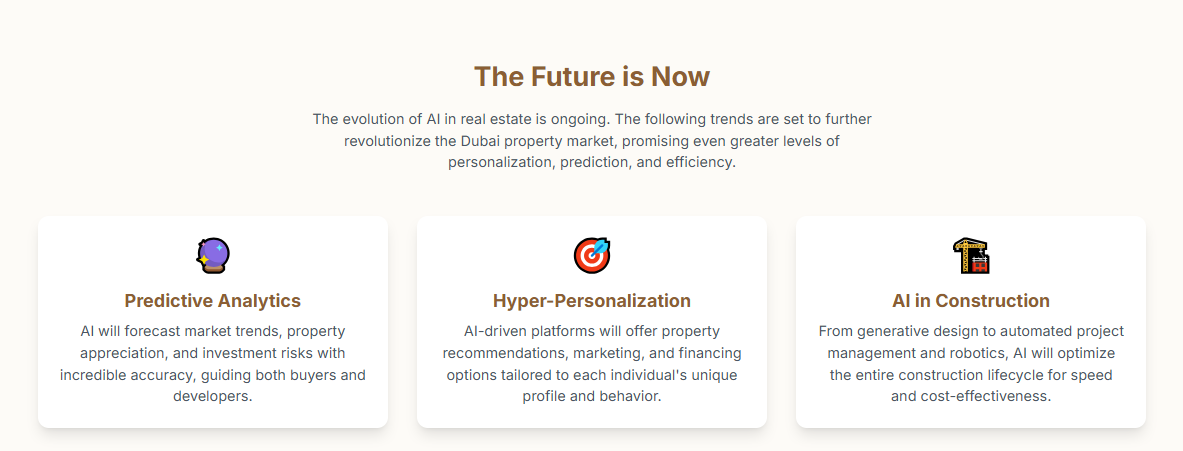
Conclusion: A Global Benchmark for a Smarter Future
Dubai’s real estate market has successfully engineered one of the world’s most advanced AI-driven ecosystems. This has been achieved through a powerful, self-reinforcing cycle of proactive government support, open data policies, and a vibrant culture of innovation. The result is a more efficient, transparent, and globally accessible market that is setting a new international standard. For investors, developers, and agents, the message is clear: in Dubai’s real estate market, embracing AI is no longer just an advantage—it’s the only way to build the future.

